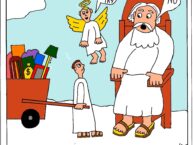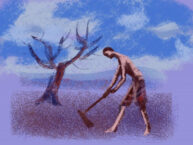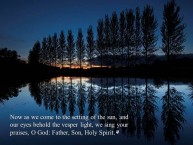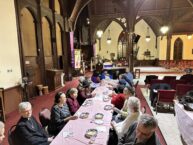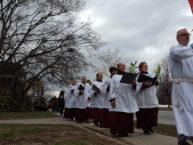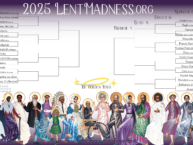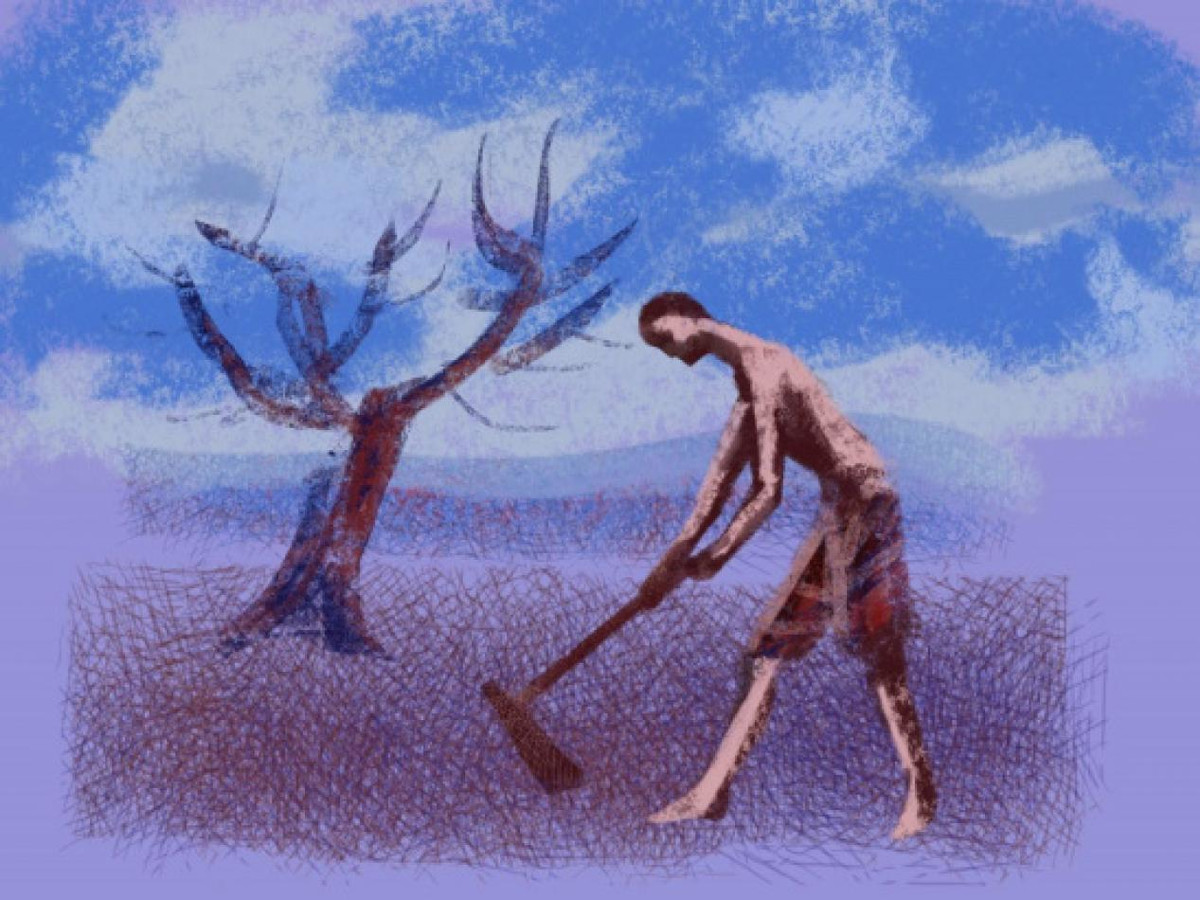
March 23, 2025: May God’s words be spoken, may God’s words be heard. Amen.
Today The Episcopal Church does a thing. We usually go right along with the Revised Common Lectionary – the assigned readings for a Sunday followed by Lutherans, Presbyterians, Methodists, and a whole lot of others, and also the Roman Catholic Church (on which it was based) to some degree. Not today though, as we replace the assigned reading from Isaiah with one from Exodus.
Now, a few years ago, when doing some researching about the story in Exodus we heard today, about the burning bush and Moses, I came across an old sermon of mine. Except, this wasn’t on our church website. It was part of the recommended resources in a course at Yale Divinity School, where the professor had included links to three sermons. Cool!, I thought. And then I remembered being in seminary, and that sometimes the resources were not good examples, but sometimes are bad ones.
So, to avoid whatever fate the other sermon was bound for, I thought maybe today I would stick with the gospel. That warm and fuzzy one about Pilate, blood, towers falling on people, a poor fig tree and the testy guy who had planted it. Nice, right? But, it turns out, the lectionary folks were right to swap out the Isaiah reading to match this one from Exodus to the gospel, because they are related.
Sure, they both have a bush or tree in it, but that isn’t really why. So, let’s first dig into the gospel…and see what we find, because what Jesus is trying to tell those earliest listeners is important for us to hear today too.
The short version of it is that some folks around Jesus were reminding him of all those who were slaughtered by Pilate in Jerusalem. This was very likely a well-known tragedy that rightly troubled people in those days, but is lost to us now. It is a reminder to us as well that Pilate, despite the cleaning up the fourth gospel does of him, was no kind philosopher troubled over crucifying Jesus. He is known in historical records as a tyrant who delighted in brutality.
Jesus challenges the explanation of the people about why this horrific event happened. And then he asks them about another tragic event that is also well known to them, but lost to us – the tower of Siloam. It may have been part of the wall of Jerusalem, but whatever it was, it fell and killed 18 people. He asks if the Galileans who were slaughtered, or those who were killed by the collapse of the tower, were worse people than any other Galileans or residents of Jerusalem? The answer, of course, is no.
Jesus goes right to the heart of their understanding of how God works in the world. Today we would call it theodicy – the way we try to explain how bad things happen when there is a good God. Often, when we are experiencing great suffering, we naturally seek answers. We want to know why? Why does God let this happen? Is God punishing me? Is God punishing them? This is when we can sadly hear some of the most harmful and wrong theology come out of the mouths of even the most well-meaning folks.
How many of you have heard people respond to the death of a child saying that “God needed another little angel.” Good Lord! Or, during a pandemic or natural disaster, there always seems to be at least one of those TV preachers out there claiming that it occurred as a punishment of God. That is essentially what the people around Jesus are trying to get him to explain – what did those “sinners” do to be the victims of such a brutal attack by Pilate? And Jesus is rebuking that theology flat out.
He then tells them how the Kingdome of God actually works, using a parable about a man who planted a fig tree, and is angry that it hasn’t borne fruit. He wants it cut down, but the gardener recommends waiting a year, allowing him to nurture it. If it still bears no fruit, then the owner can cut it down.
Too often, some folks will take this as allegory, not parable, and attempt to say that the owner is God, the gardener Jesus, the tree is us. But if we have really taken in all the way Jesus describes the Kingdom of God, especially in this gospel, that doesn’t hold water at all. God is not angry and vengeful. So, if not that, what then?
Well, one thing Jesus is trying to get at is that crap happens in life. That is just part of the fragility of humanity and creation. There are often no explanations for some events – not ones we can yet understand anyway. Our scientific curiosity has helped us to know better why things happen – either in our own bodies, the way we work in the world, or within the earth we inhabit. What was once thought a mystery – or attributed to evil – can now be understood as related to genetics, or the moon passing between the sun and the earth. Yet there are still many more questions than answers. What we can say is that things like some diseases or climate change are attributable to cell mutations or our own neglect of nature, not to the wrath of God. And, more to the point here – horrific acts of oppression like what Pilate did are not of God, but of humanity.
I think we need to remember this as we continue through Lent into Holy Week, because – just as God doesn’t punish us for our sinful behavior, Jesus didn’t die for our sins either. Jesus was killed by that brutal Pilate and the Roman Empire, with the collusion of the Sanhedrin. Jesus died by the sins of empire and oppression.
So, if not a symbol of atonement, what then?
Jesus is God’s response to our own brokenness. Or put another way, God responds not with vengeance or sacrifice, but with love. God was willing to enter into our humanity – even knowing the cost – that we might truly know love, and share that love with all the world.
So, when we encounter suffering, we know that God truly understands it, and doesn’t cause it. God joins us there, and weeps alongside us, because God has experienced it, and loving us deeply, offers us comfort, strength, and courage in the face of it. God nourishes us to live another day, or another year, or many years beyond that moment.
Or as our former Presiding Bishop, the Most Rev. Michael Bruce Curry used to say “If it’s not about love, it’s not about God.” That is the point Jesus is making in the gospel too.
Now, I mentioned earlier that this ties into the story about Moses and the burning bush. You know I like to include stories in my sermons to help illustrate something, but there really isn’t a better one than what we get with Moses – Hollywood certainly thought so – which is why many of us have this Charlton Heston image of the guy.
So, let’s just do a very brief recap. Moses is out beyond the wilderness (that right there is a whole other sermon). There he notices a bush burning but not being consumed by the fire. So, he picks up his iPhone, and starts recording live on his TikTok feed. Then a voice says “Put your phone down Moses, you’re on sacred ground.” God tells Moses that he has to go before the Pharoah and demand the release of all the Hebrew slaves in Egypt. Moses says “Are you kidding me? Not me God – I am not your guy. You need a superhero, and I don’t own a cape or tights.” This goes back and forth a bit, but eventually Moses does what God asks him to do.
So – what has that to do with the gospel, and why do we care? Good questions. Here’s the thing.
The story in Exodus is known as the call of Moses. Like the call of other prophets, Moses not only says “No!,” but “Hell, no!” Usually, like Moses, most feel inadequate to such a calling – Moses can’t speak well in public, Isaiah feels unworthy, Jeremiah reminds God he is only a child. Of course, there is Jonah who blows God off because he just doesn’t like what God wants him to do for “those” people. Besides, he had vacation plans in Tarshish. We also know what happened to Jonah – so, there is that about ignoring God’s call.
And, if we think back on the parable Jesus told, it too is a call story. In response to the judgmental assertions that the people made regarding those who experienced tragedy, Jesus responds by reminding them of the way God actually works in the world. God always partners with us to nourish and care for this earth and all its inhabitants.
Through all the centuries, long before the birth of Jesus, and long after his death, resurrection and ascension, God has called people into partnership to free the oppressed, to feed the hungry, to lift up the downtrodden, to care for creation, to lead others into relationship with God for their own sake – to love as God loves – completely and unconditionally.
God asks us to engage in the dirty work of tending to this crazy human garden, nourishing those who feel spiritually, emotionally, physically, or mentally dead. If you must make an allegory out of this parable, (don’t, but if you must) then put humanity into all three of the roles – owner, gardener, and tree. God is in the soil, the sunlight, and the water. So, what role are you?
Some of you may feel like that tree. Perhaps you have felt the judgement of those who claim ownership of your life and your life choices. Then come here to be nourished in Christ’s great love at this table, and with your parish family. Come here to be reminded that you are God’s child – loved beyond measure – just as you are.
But I want to implore you all to think about the gardener. All of us, laity and clergy, are God’s gardeners – partners with God in spreading the gospel around to bring life to the world. Yet some, we know, are called to be deacons, priests, nuns, or monks – a special type of gardening partnership with God.
This isn’t a better partnership, mind you, but a different one. And sadly, for many decades, one that too many have either pushed back against, or felt unworthy of, like the prophets of old. I suspect too, that most just never really thought about it, either for themselves, or about others. This has led to a shortage of clergy in the church. And, while churches can certainly be lay led, laity have their own calling, and that should be their primary focus. Because, as we know – call is not about wearing a collar, but living into the partnership God invites us to in our lives, with the particular gifts we have been given by the Holy Spirit.
And among us are those who were given the gifts of ordained ministry in the church, are called to it, and have not been nourished in their discernment to see it. That type of discernment requires being like Moses, stepping out beyond one’s own wilderness, out of one’s comfort zones. We need to look around to see who we know that may be called in ways they do not yet understand, and help them to step forward, help them to hear the voice of God, help them to grow into a new fruit bearing life in the church. We need to look within our own hearts too. Folks, people are seeking – the church is growing – and we need to answer the call to ordained life, if it is ours to live, that the church may continue to be a place that celebrates God’s great love, and brings life to the world.
As I have said many times before – make no mistake about it – God is calling you. Every one of you. Some of you even to a life of ordained ministry.
And God yearns for us to turn aside to listen, to hear the call. God implores us to nurture that call in others, and with a sense of urgency too.
Because right now, all over the world, there are Pharaohs and those who are enslaved.
Right now, all over the world, there are people who are looking to cut down the children of God because they are not, according to some other person, living into expectations, have been deemed worthless by, or have been judged as underserving of life and love.
The question we are asked to consider is will we push past our own insecurities and accept deep within that we, in partnership with God, can indeed bring about that beloved community of peace, wholeness, and unconditional love? Will we answer God’s calling for us?
For all who follow Christ are being called in no less a way than Moses. It is a call that takes courage, faith, and great love. We may think like Moses did, “Who am I that I should go to stand against the Pharaohs of today, and bring the enslaved out of bondage?” I would be surprised if anyone wouldn’t think that way. This is not easy work, and we can seem inadequate to the task. In fact, if one doesn’t hesitate a bit, it is likely they have no sense of the humility needed to answer the call of God. As Bernard of Clairvaux once wrote, call requires “…humility grounded on truth: within oneself, in one’s relations with others, and with regard to God.”[1]
But remember this if you feel inadequate to the task – call is not a solo adventure. We don’t have to be superheroes to do the work of God. God’s call is always a partnership. And when you feel this is more than you can do, or when you feel as dry as that fig tree as you live out that call, come home here to be nourished and renewed. For you will always be given what you need to flourish, to grow, and to feed others by the fruits of your life and labor.
And day by day, as we each answer our own call, as we tend to those who need it, that larger garden of humanity will burst with life, and there will be no part of it that is dead to another, no part of it that feels dead within the branches of their own heart, but all will bear fruit that feeds, and seeds that give way to new life. All of it will be nourished by the soil, water, and sunlight of God’s abundant love and grace.
Amen.
For the audio, click below, or subscribe to our iTunes Sermon Podcast by clicking here (also available on Audible):
The Rev. Diana L. Wilcox
Christ Church in Bloomfield & Glen Ridge
March 23, 2025
Lent 3 – Year C
1st Reading – Exodus 3:1-15
2nd Reading – 1 Corinthians 10:1-13
Gospel – Luke 13:1-9

